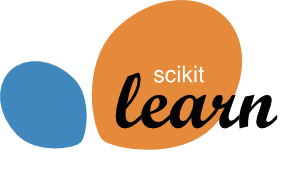
scikit-learn is a Python module for machine learning built on top of SciPy and is distributed under the 3-Clause BSD license.
The project was started in 2007 by David Cournapeau as a Google Summer of Code project, and since then many volunteers have contributed. See the About us page for a list of core contributors.
It is currently maintained by a team of volunteers.
Website: https://scikit-learn.org
Installation
Dependencies
scikit-learn requires:
- Python (>= 3.7)
- NumPy (>= 1.14.6)
- SciPy (>= 1.1.0)
- joblib (>= 0.11)
- threadpoolctl (>= 2.0.0)
Scikit-learn 0.20 was the last version to support Python 2.7 and Python 3.4. scikit-learn 0.23 and later require Python 3.6 or newer. scikit-learn 1.0 and later require Python 3.7 or newer.
Scikit-learn plotting capabilities (i.e., functions start with plot_ and
classes end with "Display") require Matplotlib (>= 2.2.3).
For running the examples Matplotlib >= 2.2.3 is required.
A few examples require scikit-image >= 0.14.5, a few examples
require pandas >= 0.25.0, some examples require seaborn >=
0.9.0.
User installation
If you already have a working installation of numpy and scipy,
the easiest way to install scikit-learn is using pip
pip install -U scikit-learn
or conda:
conda install -c conda-forge scikit-learn
The documentation includes more detailed installation instructions.
Changelog
See the changelog for a history of notable changes to scikit-learn.
Development
We welcome new contributors of all experience levels. The scikit-learn community goals are to be helpful, welcoming, and effective. The Development Guide has detailed information about contributing code, documentation, tests, and more. We've included some basic information in this README.
Important links
- Official source code repo: https://github.com/scikit-learn/scikit-learn
- Download releases: https://pypi.org/project/scikit-learn/
- Issue tracker: https://github.com/scikit-learn/scikit-learn/issues
Source code
You can check the latest sources with the command:
git clone https://github.com/scikit-learn/scikit-learn.git
Contributing
To learn more about making a contribution to scikit-learn, please see our Contributing guide.
Testing
After installation, you can launch the test suite from outside the source
directory (you will need to have pytest >= 5.0.1 installed):
pytest sklearn
See the web page https://scikit-learn.org/dev/developers/advanced_installation.html#testing for more information.
Random number generation can be controlled during testing by setting
the SKLEARN_SEED environment variable.
Submitting a Pull Request
Before opening a Pull Request, have a look at the full Contributing page to make sure your code complies with our guidelines: https://scikit-learn.org/stable/developers/index.html
Project History
The project was started in 2007 by David Cournapeau as a Google Summer of Code project, and since then many volunteers have contributed. See the About us page for a list of core contributors.
The project is currently maintained by a team of volunteers.
Note: scikit-learn was previously referred to as scikits.learn.
Help and Support
Documentation
- HTML documentation (stable release): https://scikit-learn.org
- HTML documentation (development version): https://scikit-learn.org/dev/
- FAQ: https://scikit-learn.org/stable/faq.html
Communication
- Mailing list: https://mail.python.org/mailman/listinfo/scikit-learn
- Gitter: https://gitter.im/scikit-learn/scikit-learn
- Twitter: https://twitter.com/scikit_learn
- Twitter (commits): https://twitter.com/sklearn_commits
- Stack Overflow: https://stackoverflow.com/questions/tagged/scikit-learn
- Github Discussions: https://github.com/scikit-learn/scikit-learn/discussions
- Website: https://scikit-learn.org
- LinkedIn: https://www.linkedin.com/company/scikit-learn
- YouTube: https://www.youtube.com/channel/UCJosFjYm0ZYVUARxuOZqnnw/playlists
- Facebook: https://www.facebook.com/scikitlearnofficial/
- Instagram: https://www.instagram.com/scikitlearnofficial/
Citation
If you use scikit-learn in a scientific publication, we would appreciate citations: https://scikit-learn.org/stable/about.html#citing-scikit-learn




